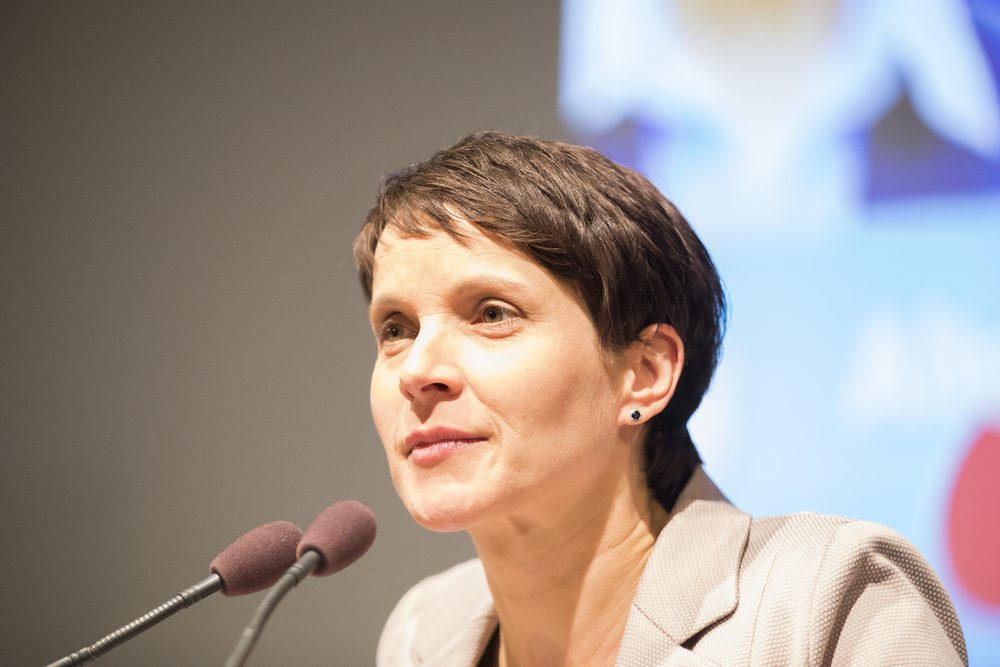
Former AfD leader Frauke Petry
Photo: NordStock / Shutterstock.com
A German broadcaster has parted ways with a television presenter after the presenter allegedly made up a racist social media post earlier this month and attributed it to Frauke Petry, the former leader of the Alternative for Germany (AfD).
Maurice Gajda, host of the programme Explosiv, was suspended by broadcaster RTL this week after Ms. Petry accused him of fabricating a post from X, the tabloid Bild reports.
The post, which Gajda broadcast on August 5th, involved a comment regarding singer Trong Hieu Nguyen, who was competing in a preliminary round for Germany ahead of the Eurovision Song Contest (ESC) earlier this year.
The alleged post, which Gajda claimed Petry had deleted, stated, “I don’t think any normal German wants to see a pink-coloured Asian at the ESC.”
While Gajda produced what he claimed was a screenshot of the post by Petry, no archive of the post exists, nor do any screenshots taken by any other users of the platform.
Petry, who was the leader of the AfD from July 2015 to September 2017, before she quit the party that same year, hit back against Gajda, accusing him of making up the post, stating, “RTL impressively demonstrates how to deal with politically uncomfortable people. You think up a racist tweet, a graphic designer implements it, and the fake is done.”
According to Bild, Petry did make a post regarding the ESC and Nguyen, but the post, which was deleted, did not invoke Nguyen’s Asian heritage and did not use the phrase “normal Germans” either.
RTL initially defended Gajda, claiming that an employee had written down the post from memory saying, “Our reporter saw the tweet in March and wrote it down verbatim. He vouches for it. The tweet was subsequently deleted by Frauke Petry, which was also mentioned in the post.”
The broadcaster then acknowledged that the post had been fabricated or at least recreated, saying, “However, the graphic implementation in the design of Frauke Petry’s Twitter profile violates our journalistic guidelines. We apologize for that.”
RTL stated Wednesday that it was suspending cooperation with Gajda, announcing,
We are suspending cooperation with Maurice Gajda until further notice, until the allegations in the room have been clarified.
The incident is just the latest that has seen a German journalist or broadcaster accused of peddling fake news in recent years, particularly when the subject matter involves right-wing politicians, activists, or voters.
In 2017, the magazine Der Spiegel published an article regarding the alleged arrest of 15 right-wing activists in Paris, but later corrected the article after it was pointed out that 14 of those arrested were actually far-left extremists.
Journalist Christian Teevs, who wrote the piece for Der Spiegel, blamed the AFP and the Austrian Press Association (APA) for giving bad information, while the AFP blamed a translation error from their original reporting in French to German.
Translation errors can and do happen, but another Der Spiegel writer was caught making up entire stories after he had received a ‘journalist of the year’ award from broadcaster CNN for his work.
Writer Claas Relotius admitted in 2018 that he had invented or distorted facts in several of his 60 articles for the magazine, going as far as inventing characters and deceiving not only the public but his fellow journalists.
Relotius’ stories largely focused on conservative areas of the United States, where he made up entire interactions with locals.
Der Spiegel issued an apology to readers over Relotius’ actions saying,
Claas Relotius committed his deception intentionally, methodically and with criminal intent. For example, he included individuals in his stories who he had never met or spoken to, telling their stories or quoting them. Instead, he would reveal, he based the depictions on other media or video recordings. By doing so, he created composite characters of people who actually did exist but whose stories Relotius had fabricated. He also made up dialogue and quotes.
Despite the negative international attention Relotius’ actions had for Der Spiegel, the publication has been accused of peddling fake news as recently as January of this year when the magazine retracted several reports of a dead Syrian child at the Greek border.
The retractions came after former Greek Migration Minister Notis Mitarachi wrote a letter to the editor-in-chief of the magazine noting that no migrants had died at the border, including the alleged five-year-old Syrian girl.
